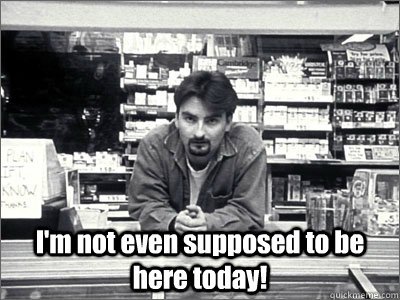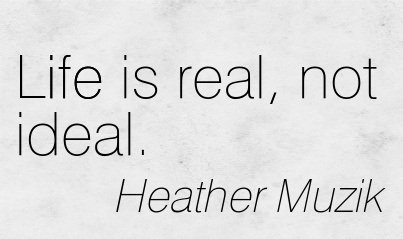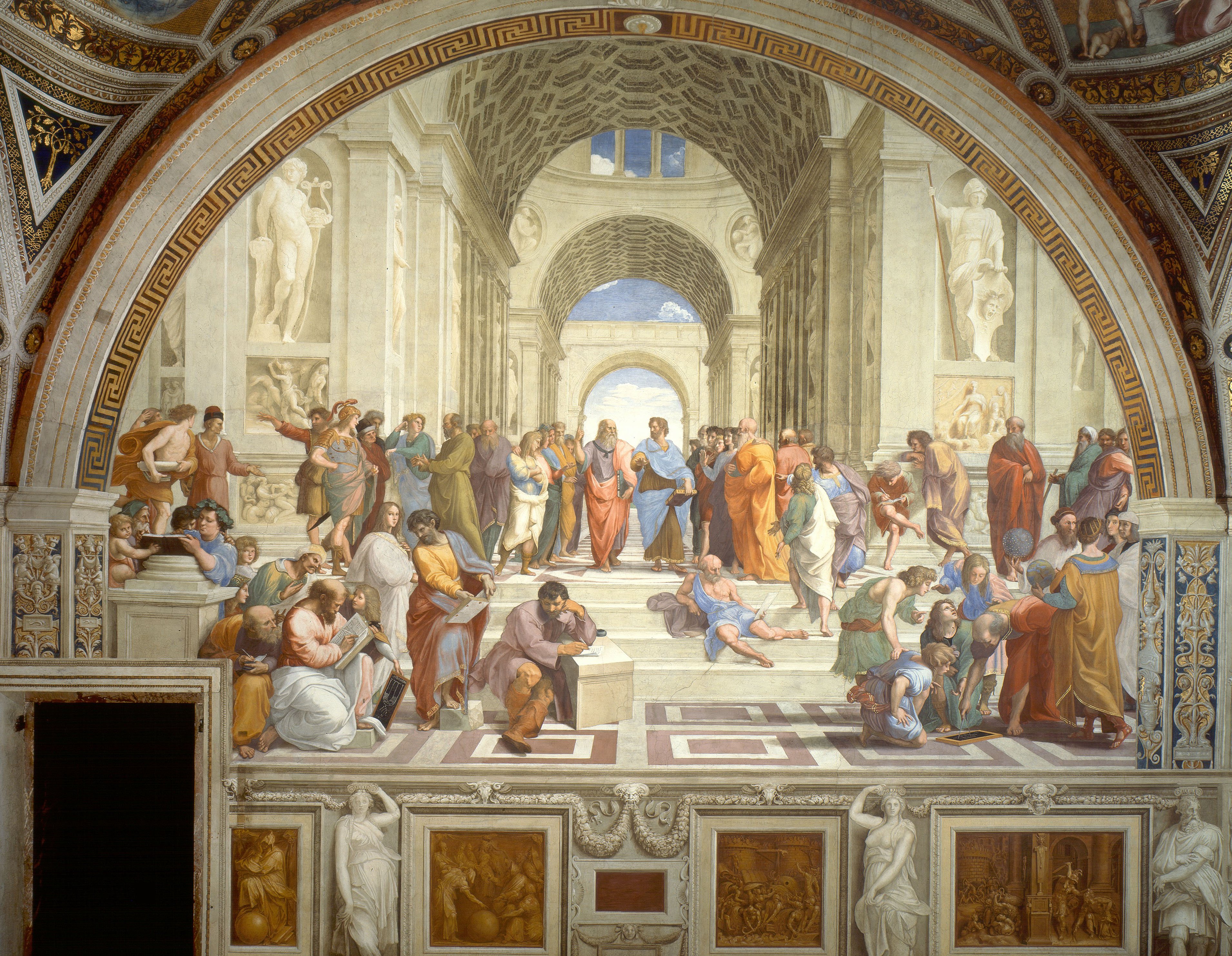This is the tenth, of a hopefully weekly series, that explores faith, religion, and Christianity. The idea is to share with you my faith, issues I am working on, and to promote discussion.
In an image obsessed culture, the "ideal" has been commercialized to make us feel inadequate and therefore to desire whatever product or service is being sold to help us reach the "perfection" they provide.

If I were living my ideal life, I would be somewhere else right now, not away from loved ones, not in debt, and not in any other undesirable conditions.
Alas!
This is not so.
I can whine, complain, and pout, or I can accept the things I cannot change, cope with what I must, and work harder to make changes when possible.

We are bombarded with images of "perfect" that are nothing but Photoshop fakeries.
This is a far cry from our real, everyday, existence where neither skin nor proportions are perfect.
We don’t all have infinite amounts of money to spend lavishly on food, vacations, and parties with our friends.
Indeed, many things are simply much more:
“Ordinary”.
But this image of the ideal has been hijacked by the ad agencies.
In Plato’s Republic, we are met with discussions concerning what has been labeled the Theory of Forms.
Specifically, we see this discussion unfold in:
Book III 402–403: Education the pursuit of the Forms.
Book V 472–483: Philosophy the love of the Forms. The philosopher-king must rule.
Books VI–VII 500–517: Philosopher-guardians as students of the Beautiful and Just implement archetypical order. Metaphor of the Sun: The sun is to sight as Good is to understanding. Allegory of the Cave: The struggle to understand forms like men in cave guessing at shadows in firelight.
Books IX–X 589–599: The ideal state and its citizens. Extensive treatise covering citizenship, government and society with suggestions for laws imitating the Good, the True, the Just, etc.
We pick up the conversation in BOOK V with Glaucon asking “if curiosity makes a philosopher”?
The following excerpt of Plato’s Republic is made available by The Project Gutenberg and “is for the use of anyone anywhere at no cost and with almost no restrictions whatsoever”.
Glaucon said: If curiosity makes a philosopher, you will find many a strange being will have a title to the name. All the lovers of sights have a delight in learning, and must therefore be included. Musical amateurs, too, are a folk strangely out of place among philosophers, for they are the last persons in the world who would come to anything like a philosophical discussion, if they could help, while they run about at the Dionysiac festivals as if they had let out their ears to hear every chorus; whether the performance is in town or country—that makes no difference—they are there. Now are we to maintain that all these and any who have similar tastes, as well as the professors of quite minor arts, are philosophers?
Socrates in response (and then the two go back and forth in the dialogue):
Certainly not, I replied; they are only an imitation.
He said: Who then are the true philosophers?
Those, I said, who are lovers of the vision of truth.
That is also good, he said; but I should like to know what you mean?
This discussion, which is worth reading, continues on, but for this article, I will skip ahead, and only include parts.
We pick up with Glaucon asking questions and Socrates responding, developing the difference between knowledge and opinion:
And, as knowledge corresponded to being and ignorance of necessity to not-being, for that intermediate between being and not-being there has to be discovered a corresponding intermediate between ignorance and knowledge, if there be such?
Certainly.
Do we admit the existence of opinion?
Undoubtedly.
As being the same with knowledge, or another faculty?
Another faculty.
Then opinion and knowledge have to do with different kinds of matter corresponding to this difference of faculties?
Yes.
And then:
Well then, is not-being the subject-matter of opinion? or, rather, how can there be an opinion at all about not-being? Reflect: when a man has an opinion, has he not an opinion about something? Can he have an opinion which is an opinion about nothing?
Impossible.
He who has an opinion has an opinion about some one thing?
Yes.
And not-being is not one thing but, properly speaking, nothing?
True.
Of not-being, ignorance was assumed to be the necessary correlative; of being, knowledge?
True, he said.
Then opinion is not concerned either with being or with not-being?
Not with either.
And can therefore neither be ignorance nor knowledge?
That seems to be true.
But is opinion to be sought without and beyond either of them, in a greater clearness than knowledge, or in a greater darkness than ignorance?
In neither.
Then I suppose that opinion appears to you to be darker than knowledge, but lighter than ignorance?
Both; and in no small degree.
And also to be within and between them?
Yes.
Then you would infer that opinion is intermediate?
No question.
But were we not saying before, that if anything appeared to be of a sort which is and is not at the same time, that sort of thing would appear also to lie in the interval between pure being and absolute not-being; and that the corresponding faculty is neither knowledge nor ignorance, but will be found in the interval between them?
True.
And in that interval there has now been discovered something which we call opinion?
There has.
Then what remains to be discovered is the object which partakes equally of the nature of being and not-being, and cannot rightly be termed either, pure and simple; this unknown term, when discovered, we may truly call the subject of opinion, and assign each to their proper faculty,—the extremes to the faculties of the extremes and the mean to the faculty of the mean.
True.
This being premised, I would ask the gentleman who is of opinion that there is no absolute or unchangeable idea of beauty—in whose opinion the beautiful is the manifold—he, I say, your lover of beautiful sights, who cannot bear to be told that the beautiful is one, and the just is one, or that anything is one—to him I would appeal, saying, Will you be so very kind, sir, as to tell us whether, of all these beautiful things, there is one which will not be found ugly; or of the just, which will not be found unjust; or of the holy, which will not also be unholy?
No, he replied; the beautiful will in some point of view be found ugly; and the same is true of the rest.
Finally this book concludes with:
Shall we then be guilty of any impropriety in calling them lovers of opinion rather than lovers of wisdom, and will they be very angry with us for thus describing them?
I shall tell them not to be angry; no man should be angry at what is true.
But those who love the truth in each thing are to be called lovers of wisdom and not lovers of opinion.
Assuredly.

In all honesty, if you haven’t noticed, I am not sure where I am going with all this.
I wanted to point out that we are fed false ideals about how life should be.
These , in turn, make people unhappy.
Additionally, that although it is not easy to discern sometimes, there is an ideal form of concepts such as beauty, justice, and the like.
But I am not sure I demonstrated this properly, if at all.
Finally, I wanted to get to the point that often people make false pictures not only of the “ideal” but also “idealize” the past.
“Melancholy people are apt to pore altogether upon the days of old and the years of ancient times, and to magnify them, for the justifying of their own uneasiness and discontent at the present posture of affairs. But say not thou that the former days were better than these, because it is more than thou knowest whether they were or no, Eccl. 7:10 .” - Matthew Henry Commentary
Without getting into specific politics, we see this in the idealized “Make America Great Again” slogan and the real question of what exactly does that mean or refer to?
As noted, my life is sometimes, if not always, less than ideal.
Instead of complaining that things are not the way I want them to be, or being impatient with God for not doing my will, I should check myself.
Life is full of uncertainty.
But my lack of knowledge, does not change God’s purpose for my life and His timing.
“And we know that for those who love God all things work together for good, for those who are called according to his purpose.” - Romans 8:28(ESV).
Therefore, when I don’t know where I am going, or what I am going to do, I know that I am not forgotten by God and I need not fear.
Brothers and Sisters, Makers and Means International needs you!
They are a growing organization that is seeking to aid local pastors around the world.
If this is something you are interested in, drop me a line.
If this relates to you and you are interested in knowing more, please ask someone. Me. My wife. A local pastor. A neighbor you know who is a Christian. But please ask and I guarantee you that they will be excited to tell you more. They will especially appreciate that you asked them so that they are not forcing their beliefs upon you but getting your permission to share. It may even be something they have been praying for.
Lord willing, see you all next Sunday!
Thanks,
@strangerarray

Please follow me, @strangerarray, to keep up to date with my other fiction, nonfiction, and other post.
Also feel free to send donations to: PayPal.Me/michaelpaine because noting is ideal.
Please check out the previous discussions:
Disparity on Display.
This discussion takes a look at disparity and injustice and proposes guidance on a response.
Comfort and Contentment
This post examines my struggle with the differences between being content and being comfortable.
Testify
This post documents part of my journey that lead me from being an enemy of God to being saved by Jesus Christ.
Praise and Worship
This takes a look at the awkward feelings about publicly praising and worshiping the Lord and what difference that has made in my life.
Reasons to Believe
We take a micro tour of Christian Apologetics and the impact it has had on my faith. I am not the best at it and so I direct to sources greater than myself to help others.
Do I have to go?
The question of church attendance is addressed from my perspective of being on both sides of the equation as a non-believer and believer who did and didn’t attend Sunday service at different times in my life.
In God We Trust
Trusting in God is not an easy thing sometimes, especially when you don’t know the next step.
It’s Hard to Find Good Help These Days
There is a great disconnect. Getting “plugged in” also means we may “disconnect” and not help out. My call is for the faithful to participate more and more fully in the mission to share Christ with the world.
Breaking the Habit of Self-Destruction
I address the topic of my struggle with self-destructive behavior and transition into looking at the trials we face and how we can deal with them.
